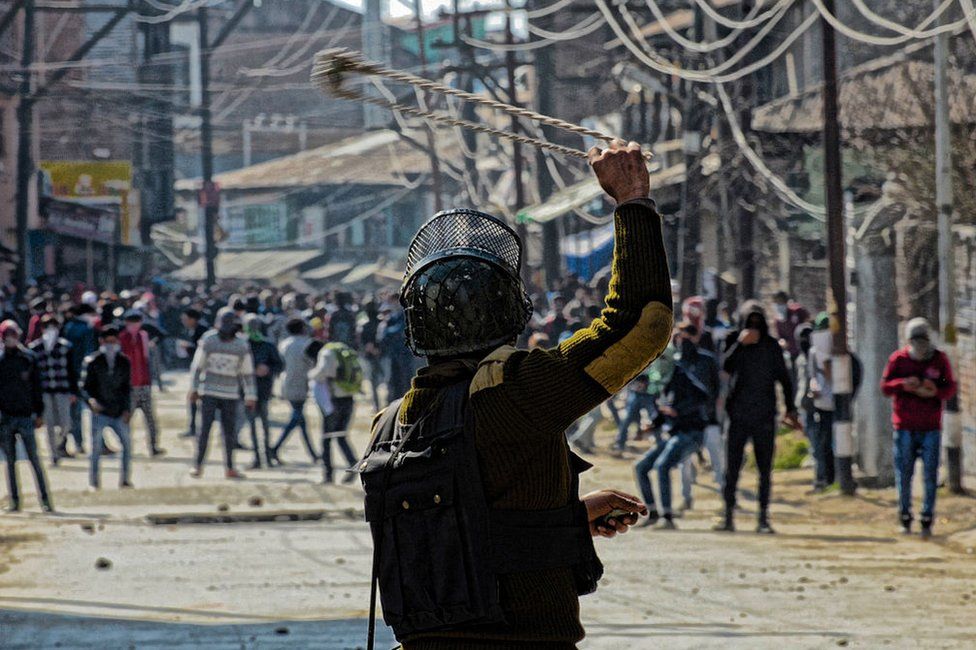Kashmiri struggle and Indian repression appear to be defining elements of the disputed region. The Valley remains haunted by blood spilled ruthlessly over the years. Ever since independence in 1947, the attitude of every Indian government has been derogatory towards Jammu and Kashmir – be it Indian National Congress (INC) or Bharatiya Janata Party (BJP). But now, with Narendra Modi in office, the situation has further exacerbated given that he has exploited the issue to strengthen his political base. Resultantly, an environment has been carved out where religion and ethnicity define the level of acceptance granted to citizens.
In such an atmosphere, Kashmiri identity is now categorised as foreign, rebellious and a threat to the state. Disregarding all human rights, Kashmiri Muslims continue to suffer at the hands of Indian hardliners. State terrorism is routinely practiced in Indian Illegally Occupied Jammu and Kashmir (IIOJK) where police harassment, lynching, torture, interrogations, arrests and detention have been accepted as a norm. There are extensive curbs on the media, massive censorship and lack of independent reporting. Anybody who speaks for their rights is forcefully and violently silenced. The Indian government strictly implements the notorious Public Safety Act (PSA) which allows detention for up to two years and deprivation of legal representation to the detainee. Any individual who tends to highlight the horrible conditions of Kashmiris or speaks out against the aggression is detained under this act.
Apart from on-ground assault on Kashmiris, its special status has been withdrawn after the abrogation of Article 370 on 5th August 2019 followed by a stringent lockdown which still remains in place. Demographic changes are being forcefully imposed in the region. The citizenship law under Article 35A stands null and void allowing Indians throughout the country to purchase property in IIOJK, avail scholarships and government jobs. Previously, only ‘permanent residents of the state’ had exclusive rights of ownership. The ultimate aim behind this move is to convert Muslim Kashmiri population into a minority and exhaust the movement.
It is equally disturbing that these crimes have been institutionalised in Indian state machinery which means that Kashmiris are subjected to brutal treatment and deliberate marginalisation by all strata of society. The classification of Kashmiri identity especially based on religion has turned a large segment of Indian society against them, inciting discriminatory behaviour and fuelling violence. Persistent silence of by state officials on these crimes is interpreted as an approval and has contributed to increased hostility not only in Kashmir but throughout India.
Crimes against humanity in IIOJK, by the Indian state and society, have reached such an extent that recently Stoke White, a UK based law firm demanded arrest of Indian Army Chief General Manoj Mukund Naravane as well as Home Minister Amit Shah. Gregory Stanton, founder of ‘Genocide Watch’ has also recently asserted that there is a potential of Muslim genocide in India. During a US Congressional Briefing, he warned that ‘clear signs and processes’ of a genocide are visible in India, particularly in Assam and IIOJK. In another interview, he drew parallels of India with Rwanda where similar events were witnessed before the genocide broke out. The most concerning aspect which he mentioned in his interview was that this genocide would be different from previous ones noting that it will not be carried out by the state. According to him, Indian citizens will be the ones executing it in the shape of mobs and it will be similar to the mob violence witnessed during the 1947 Partition.
Indeed, Stanton makes a very logical prediction and if it becomes a reality, it will be disastrous, particularly for Kashmiri Muslims. Given that Kashmiri Muslims are considered more alien and anti-state than other Muslim communities in India, they are significantly more prone to become targets of a potential genocide. In such circumstances, the state will only play an observatory role as seen in Gujarat where Narendra Modi was the Chief Minister when the notorious 2002 massacre transpired under his watch.
Like every year, Pakistan in its efforts to provide moral and diplomatic support, will observe Kashmir Solidarity Day on 5 February to draw international attention towards this pressing issue. It has become more important than ever to apprise the international community, particularly major powers, that they recognise and stop the horror which is taking place in Jammu and Kashmir on a daily basis, denounce the wrong-doings of the incumbent Indian government and take meaningful action in this regard. As a nation, we must contribute consistently towards this cause, individually and collectively. Pakistani citizens, media, think-tanks and the government should keep raising their voices for Kashmiris at domestic and international platforms to keep the issue alive and avert an impending genocide.
Shaza Arif is a researcher at Centre for Aerospace & Security Studies (CASS), Islamabad, Pakistan. She can be reached at cass.thinkers@gmail.com
Image Source : Masroor, R.2021, “Kashmir fury at India’s plan to redraw voting map,” BBC News,December 23,https://www.bbc.com/news/world-asia-india-59737858




